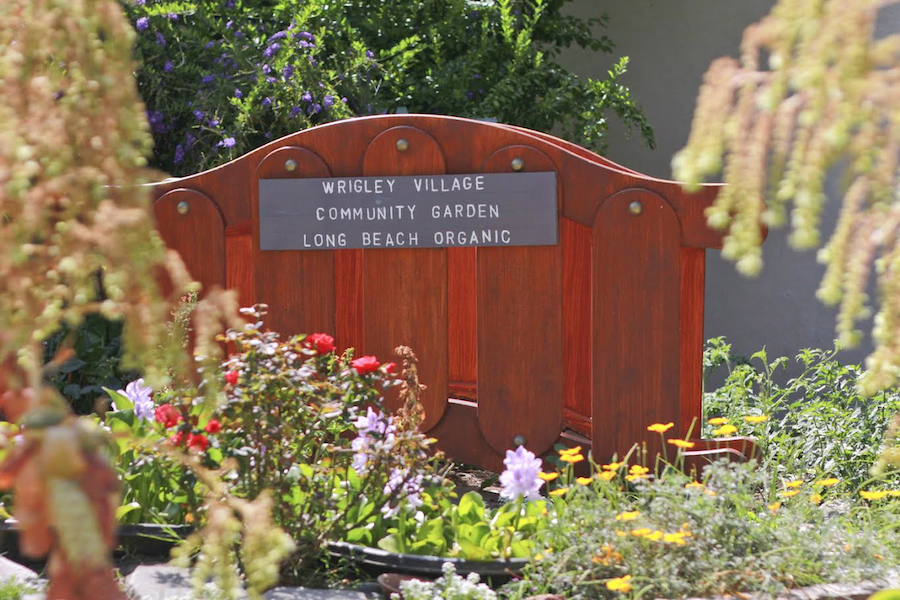
Above photo courtesy of Long Beach Fresh, pictured below, Farmlot 59 located in the Seventh District. Photo by Gregory Moore.
After a unanimous vote by the Long Beach City Council the city will explore whether or not it is feasible to implement an urban agriculture incentive program that could open up vacant or untended lots for urban farming.
In 2013, the State of California passed the Urban Agriculture Incentive Zones Act (AB 551), which allows for local municipalities to reclassify unused lots as farmland and tax them at the lower rate reserved for agricultural lots. The act applies to lots of less than three acres and requires the owner of the lot to enter into a contract with the city for a five-year commitment to allow it to be used for community gardening.
Vice Mayor Suja Lowenthal, who has been a major advocate for urban farming, said that there is a desire in the community for more of these opportunities to exist. She said she’s anticipating the results of the report from the city manager, which are due back in 60 days.
“Farm to table is something that we had a very long time ago as a way of life before it became kind of posh from a local restaurant standpoint,” Lowenthal said. “I appreciate going back to that and look forward to seeing where an urban agricultural incentive zones program can take us.”
The city has recently let up on some restrictions regarding urban agriculture, most recently lifting some of the obstacles that prevented residents from keeping goats, chickens or bees at their homes.
The ordinance passed in 2015 restructured the guidelines for keeping these animals on residents’ properties, making the buffer zones from neighboring structures smaller, but also setting hard numbers on the maximum amount of animals able to be raised by a single residence.
Long Beach Fresh Co-Director Tony Damico spoke at Tuesday’s meeting about the importance of reconnecting people to their food sources and growing the spaces in which they’re able to cultivate fresh produce. He said while the city currently has a handful of community gardening spaces, they’re mostly full and have long waiting lists for those wishing to join the “seeders” that already tend those locations.
“While we have at least 14 community gardens in Long Beach, there’s still very high demand,” Damico said. “And there’s also only four small urban farms. We could certainly benefit from more opportunities to buy more local produce for those who don’t necessarily have the interest or the time and resources to garden themselves.”
 According to an initial report from Los Angeles County on the number of potential parcels of land open to incentive zoning, over 1,000 locations in Long Beach were identified. Damico said that while his group and other fresh food advocates aren’t shooting for 1,000 new farming locations, a realistic goal would be to double the amount of urban farm space, which could help to alleviate some of the backlog of demand.
According to an initial report from Los Angeles County on the number of potential parcels of land open to incentive zoning, over 1,000 locations in Long Beach were identified. Damico said that while his group and other fresh food advocates aren’t shooting for 1,000 new farming locations, a realistic goal would be to double the amount of urban farm space, which could help to alleviate some of the backlog of demand.
Providing tax breaks to land owners who offer up parcels could help move that process along.
Joe Corso of Long Beach Organic, a non-profit organization that runs nine community gardens in the city, said that turning vacant lots and blighted properties into community gardens is good for everyone involved, including the property owners who would be offered a lower tax rate under the program.
“These gardens are a win, win, win situation,” Corso said. “First it’s a win for our members who have a place in the neighborhood to grow healthy food for their tables, and it’s also a win for the community when a vacant lot is turned from an eyesore into a verdant garden. It becomes a neighborhood focal point, and whether or not they participate, neighbors enjoy watching things grow where once there was an empty lot.”
The item was brought to the council floor by Ninth District Councilman Rex Richardson who said that in addition to providing modest economic opportunities through the sale of fresh foods grown on these lots, community gardens are a good source of education about the efforts put into growing fresh foods and could help create more vibrant green spaces in communities that currently lack them. If the city were to implement a version of this program, it would align with more recent efforts to ease restrictions and promote sustainable food practices.
“We are a city that values health, sustainability, community and a strong urban agriculture incentive zones program would help support those values as well,” Richardson said. “This program would help to lessen blight and would also give small-scale community gardens a better chance to thrive and would in turn benefit our communities.”

